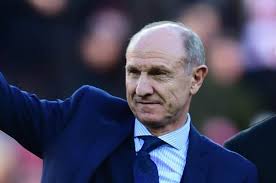Dennis Tueart
 Dennis Tueart will always make his home on the blue side of Manchester, England. He is still remembered as the scorer of what has been called the greatest moment in the long history of the League Cup — a wondrous bicycle kick in City’s victory against Newcastle in the 1976 final. Less than two years later, he was off to the U.S. and the Cosmos, one of the rare players who left Europe (and first England international) in the prime of his career to play in the NASL. He scored two goals as New York won Soccer Bowl ’78 and was named the game’s MVP.
Dennis Tueart will always make his home on the blue side of Manchester, England. He is still remembered as the scorer of what has been called the greatest moment in the long history of the League Cup — a wondrous bicycle kick in City’s victory against Newcastle in the 1976 final. Less than two years later, he was off to the U.S. and the Cosmos, one of the rare players who left Europe (and first England international) in the prime of his career to play in the NASL. He scored two goals as New York won Soccer Bowl ’78 and was named the game’s MVP.
After scoring 59 goals in 140 games for Manchester City from 1974-78, Dennis Tueart fielded offers from the red side of town, United (“You know what I say about United fans,” he said, “You always have time to mature”), and Nottingham Forest (a team that was about to win back-to-back European Cup titles under Manager Brian Clough.
“I had a chance to be a pioneer,” he said. “I’m not a guy who does things in half. They only wanted me to go for the summer. But if I was to commit, it had to be full on.”
So the plucky English winger, forever remembered as a skillful, left-footed No. 7, decamped for New York and the undiscovered soccer country of the U.S. The opportunity to play with the likes of Franz Beckenbauer, Giorgio Chinaglia, Carlos Alberto, Johan Neeskens and others was simply too tantalizing.
“The excitement. The energy. The support. The big profile,” he said. “The Cosmos were the forerunner of what’s happening now in the Premier League and in Europe. The Cosmos model is exactly what’s happening now. As a project, a strategy it was ahead of the world. Unfortunately, America as country, wasn’t ready for it.”
For Tueart, in soccer and in life, the goal is simple: Winning. There is no substitute, no other reason to lace them up. No excuses.
“I went for a simple reason: to win something,” he said. “It’s what you have to have in your mentality in soccer. In this world you don’t get too many opportunities to be a winner. Your career doesn’t go on forever. To win something, that’s what you’re remembered for.
“People ask me now who was the best player I played with and there’s no question it’s Franz. It was fantastic, great for me. I enjoyed seeing people’s different attitudes and approach to the game. As Europeans we were seen as world stars, given to different challenges in our home country. The main thing is football is football, there are basic core principles that are the same. What was different was to see the desire of Carlos Alberto, Giorgio, Neeskens all the world stars, because their desire to be a winner was obvious.
“The beauty of the team, even when we had highly professional arguments in the dressing room and on the pitch, it was because we wanted to win — no matter where came from. The Cosmos insisted on that.”
That institutional expectation to win was never clearer to Tueart on the Cosmos’ initially rocky road to triumph in Soccer Bowl ’78. In the first game of the conference semifinals before more than 45,000 fans at Metropolitan Stadium in Minnesota on Aug. 14, the Kicks scored an emphatic 9-2 victory as Alan Willey scored five goals. Tueart left the match early with an injury and was doubtful for the return match two days later in East Rutherford, N.J. He did, however, play in the game, making a quick recovery.
“We had a meeting at a hotel near the Meadowlands,” Tueart said. “Steve Ross [the chairman of Warner Communications, which owned the Cosmos] came. He demanded that we win the game and advance. Steve came in with all the other executives and said he had just come from a meeting on the West Coast with Warner people who were involved in a big project, the movie “Superman.” And all they wanted to talk about was the Cosmos. He said he felt embarrassed by the defeat and said, ‘I don’t like to feel embarrassed.’ ”
“It was a fantastic 15-20-minute motivational speech and it told me that the desire to win wasn’t only the players’, but the whole organization.”